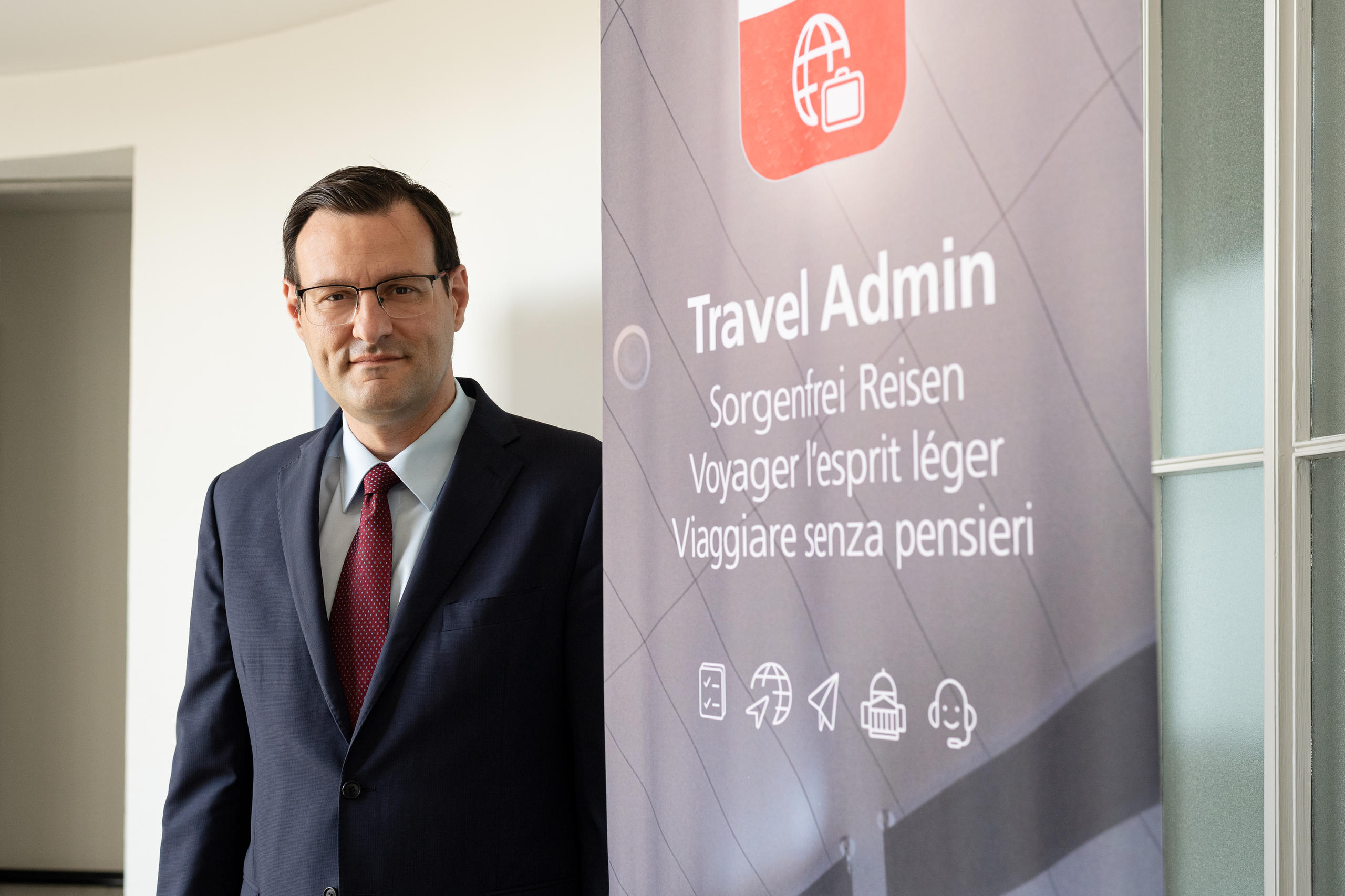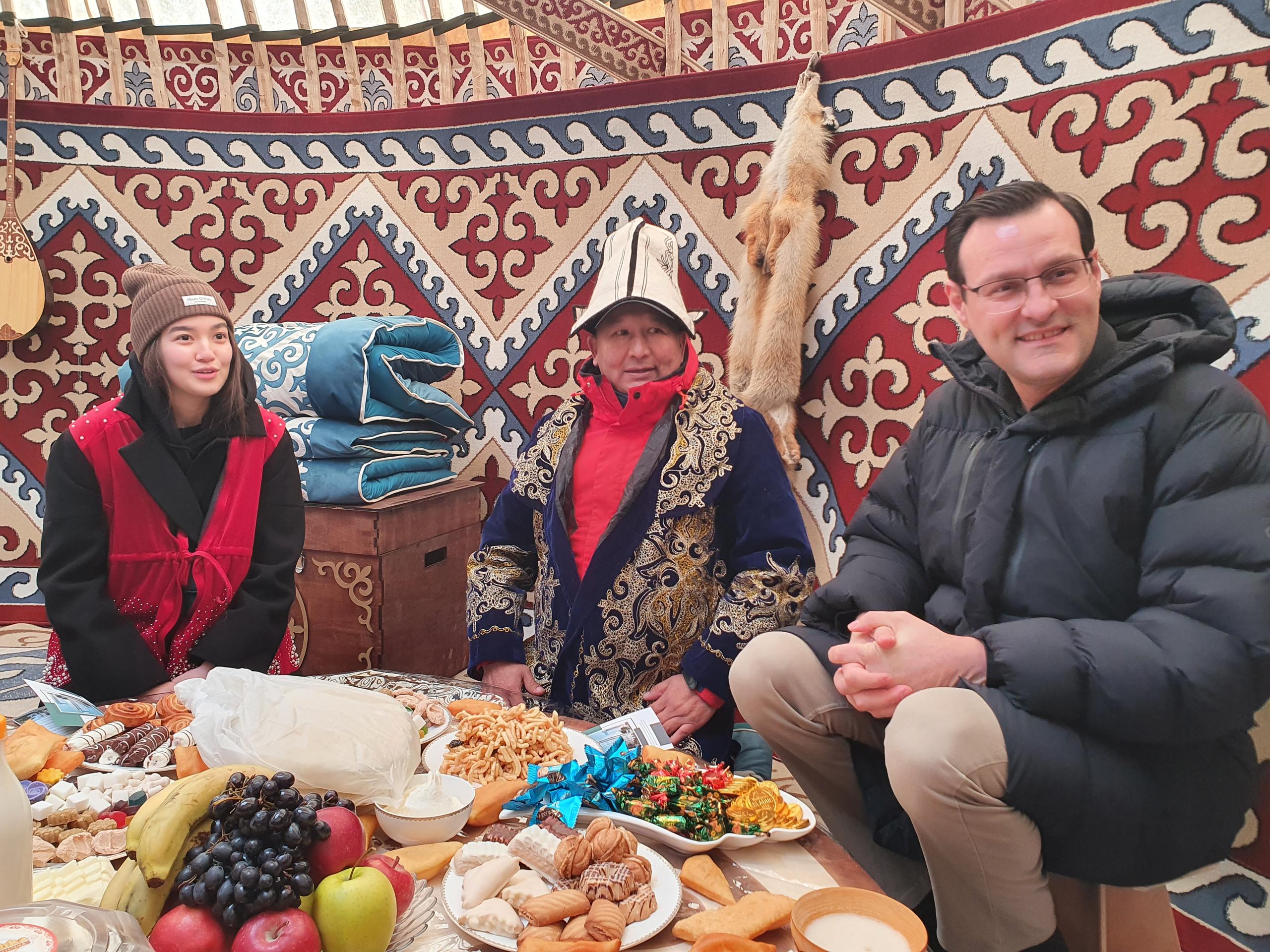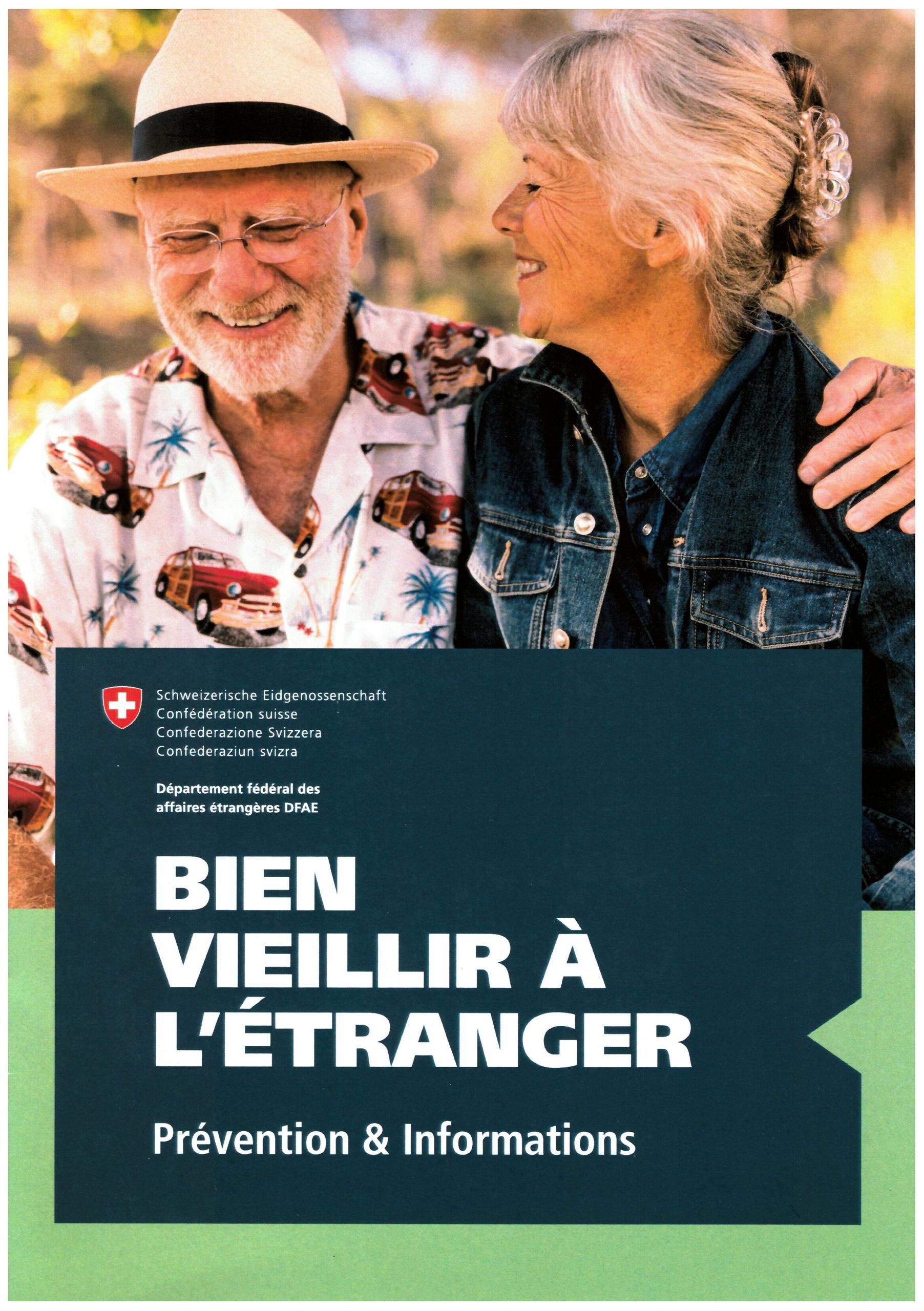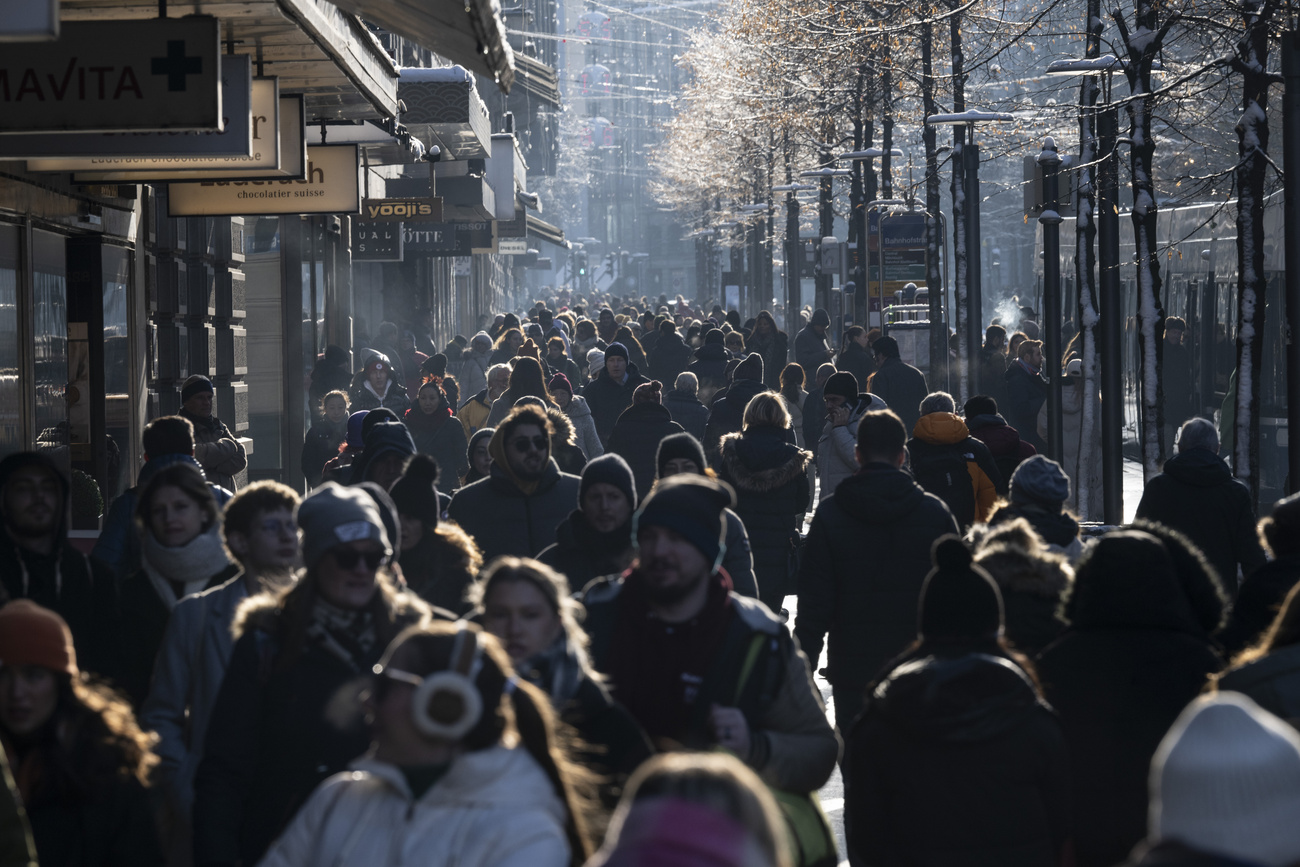
‘Receiving assistance from foreign representations is not a right’

David Grichting, the new director of the foreign ministry’s Consular Division, faces a number of challenges. In particular, he will have to implement the budget cuts decided by the federal administration and deal with the ageing population of Swiss nationals abroad.
SWI swissinfo.ch: You have been in post in Bern since April. Tell us a little about your career path.
David Grichting: After a few years in consultancy in the private sector, I wanted a career change. Before taking up my current post, I had the opportunity to train in Israel, manage our consulate in Kosovo, head the foreign ministry’s finance division in Bern and head our embassy in Astana, Kazakhstan.
The work at the foreign ministry is very interesting and varied. At the Consular Division, human destinies are at the centre of our activities. We provide a concrete and immediate service to our compatriots. It’s all about public service, not profit.
SWI: In practical terms, what is the role of the Consular Division?
D.G.: Our role is twofold. On the one hand, we have to ensure that consular services are efficient and customer-focused; on the other, we act as a one-stop shop for enquiries from Swiss nationals abroad.
SWI: Can the diaspora also provide support for diplomats in the countries where they are posted?
D.G.: Our compatriots around the world do indeed bring us different perspectives on the countries in which they live. They can help us to understand them better and are an important source of information. They also pass on our values abroad and, in this way, help to strengthen Switzerland’s image with a view to the bilateral cooperation that we would like to strengthen. In addition, many honorary consuls are Swiss nationals living abroad. They actively support us in our work and are exemplary in their commitment to our community.

SWI: However, the Swiss Abroad do not always behave in an exemplary manner. Are any Swiss nationals currently in difficult situations?
D.G.: In 2022, we dealt with 1,817 cases of consular protection. There are always Swiss nationals in difficulty somewhere in the world. Sometimes for financial, family or legal reasons.
Cases of consular protection particularly affect tourists. The Swiss make around two trips abroad per person per year, a total of almost 16 million.
Twenty years ago, most people went on organised trips. Today, bookings are made individually and the destinations are increasingly exotic. When a problem arises, Swiss tourists don’t necessarily have a local network and sometimes struggle to help themselves.
In this context, I think it’s important to remember that receiving help from external representations is not a right. This point is specified in the Swiss Abroad LawExternal link. Whenever we can, we are obviously there to help with as much empathy as possible. But whether short or long, a stay abroad takes preparation, and this stage of the journey should not be underestimated.
SWI: What can embassies do to deal with these cases?
D.G.: Switzerland has a network of 167 representations and over 200 honorary consuls. We therefore have a large network which, when the conditions are met, is able to help Swiss nationals in need by providing them with consular protection.
For example, we issue passes, contact relatives in Switzerland, provide social assistance in certain specific cases, refer people to lawyers or visit Swiss nationals in prison.
SWI: Is the arrival of artificial intelligence (AI) already having an impact on the way the Consular Division works?
D.G.: In the federal administration, AI is still in its infancy. There is still a whole debate to be held on information security. We realise the added value it can bring to certain consular services, but its introduction will still take time and will be a step-by-step process.
I think that AI, in the same way as digitisation a few years ago, will enable us to improve certain simple services, so that we can free up more time for cases that require a physical presence, such as consular protection.
In 20 years, the number of Swiss nationals living abroad has risen by 30% and the volume of visa applications has increased by 5% a year, but the number of consular staff has remained stable. It is therefore essential to find tools that will enable us to optimise our services so that we can do more with the resources available.
SWI: At the beginning of 2023, the government decided that each department should save 2% of its current expenditure from this summer. The foreign ministry told SWI swissinfo.ch that the external network should save CHF10 million ($10.9 million) a year – 2% of its annual budget of CHF495 million. Where will these cuts be made?
D.G.: The foreign ministry is prioritising measures to ensure that they correspond to Switzerland’s foreign policy interests and the resources available. As part of the development of concrete measures, the Consulate General in Chengdu (China) remains provisionally closed and the foreign ministry is studying the question of closing the embassy in La Paz (Bolivia). The decision on the need to close these representations has been postponed for a year and will be reassessed when the time comes.
The external network is the foreign ministry’s biggest item of expenditure, even though a representation costs Swiss citizens an average of just CHF0.37 a year.

SWI: In view of the ageing of the Swiss population abroad, the foreign ministry decided to launch an awareness-raising campaign called ‘Ageing well abroadExternal link’ in spring 2022. What’s the situation today?
D.G.: Of the 800,000 Swiss Abroad, almost 23% are over 65. That’s more than 183,000 people. What’s more, we’re seeing more and more Swiss people choosing to live abroad when they retire. We want our representations to have the means to address this specific population.
Through the brochures, videos and webinars we are currently launching, we want to remind them of the principle of individual responsibility. And so that people can help themselves, we need to make them aware of certain elements.
The material will be distributed by the consulates when the Swiss register there. We plan to organise events in the representations for Swiss who reach retirement age abroad. In Switzerland, we are also working to ensure that retired people receive this information from their local authorities when they announce that they are moving abroad.
Edited by Balz Rigendinger. Translated from French by DeepL/ts
According to a Blick articleExternal link published on August 24, the Swiss Federal Audit Office (SFAO) has called the government to order over the new Swiss embassy in Beijing (China). It is expected to cost CHF48 million instead of the CHF25 million initially planned.
The Consular Division is not responsible for the construction or renovation of foreign representations. The finance ministry and the Federal Office for Buildings and Logistics are responsible for this.
When questioned by swissinfo.ch, the Federal Office for Buildings and Logistics said the cost estimate of CHF25 million was based on a feasibility study carried out in 2017. Since then, “the general economic conditions have changed significantly”, it says.
“Thus, the April 2022 cost estimate of CHF48 million takes into account the influence of the Covid-19 pandemic and potential inflation. […] In view of the Chinese markets and global inflation fluctuations, this is the most likely assumption for future developments.”
In 2019 Switzerland renovated its embassy in Moscow at a cost of CHF42 million and opened a new one in Minsk, Belarus, in 2020.
Since then, Russia, supported by Belarus, has invaded Ukraine, reshuffling the cards of European diplomacy. When asked about the need for these investments and the activities now undertaken by these two embassies, the foreign ministry, which is “responsible for implementing Switzerland’s foreign policy strategy”, says that it pursues a universal foreign policy, which is why Switzerland is also present in demanding contexts such as Belarus and Russia.
According to foreign ministry spokeswoman Elisa Raggi, “these embassies play an important role in defending Swiss interests, including in times of war. Their area of activity is slightly adapted to the circumstances, but on the whole corresponds to the usual tasks of a Swiss representation abroad”.

In compliance with the JTI standards
More: SWI swissinfo.ch certified by the Journalism Trust Initiative





























You can find an overview of ongoing debates with our journalists here . Please join us!
If you want to start a conversation about a topic raised in this article or want to report factual errors, email us at english@swissinfo.ch.